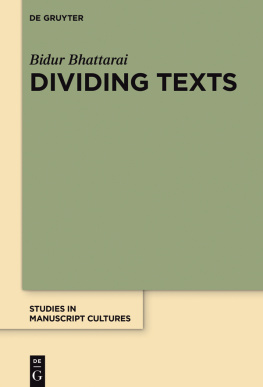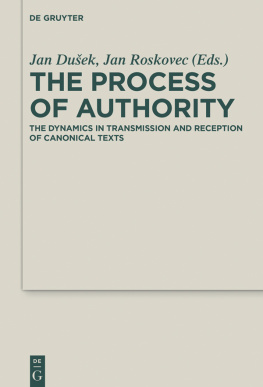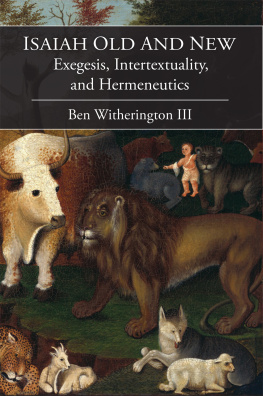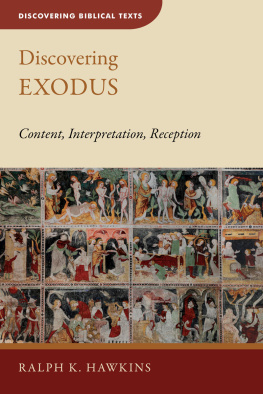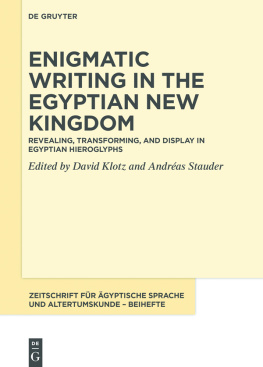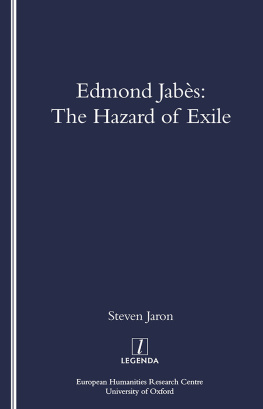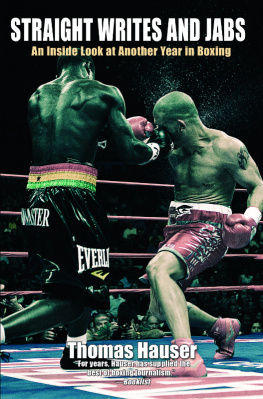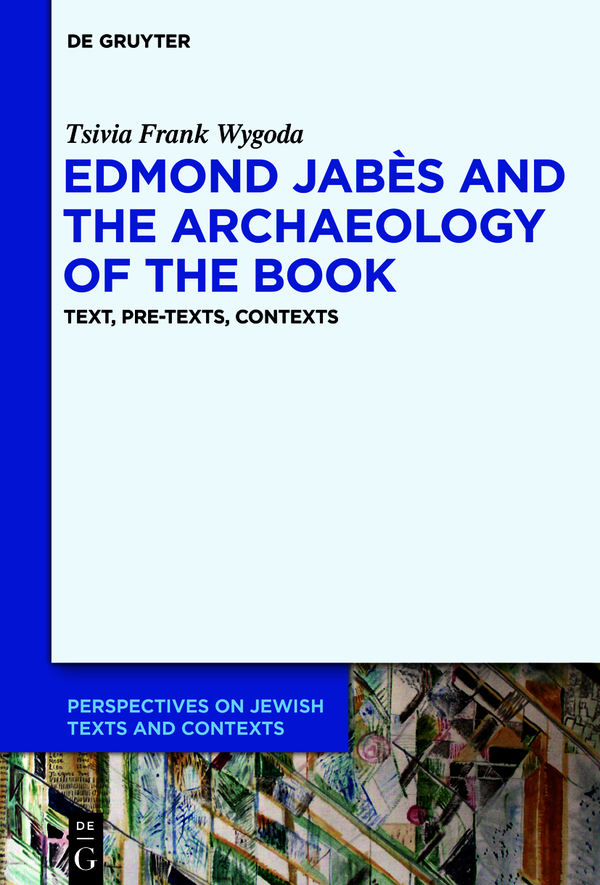Perspectives on Jewish Texts and Contexts
Edited by
Vivian Liska
Robert Alter
Steven E. Aschheim
Leora Batnitzky
Richard I. Cohen
Mark H. Gelber
Moshe Halbertal
Christine Hayes
Moshe Idel
Samuel Moyn
Ilana Pardes
Alvin Rosenfeld
David Ruderman
Bernd Witte
Volume
ISBN 9783110629552
e-ISBN (PDF) 9783110643022
e-ISBN (EPUB) 9783110640786
Bibliographic information published by the Deutsche Nationalbibliothek
The Deutsche Nationalbibliothek lists this publication in the Deutsche Nationalbibliografie; detailed bibliographic data are available on the Internet at http://dnb.dnb.de.
2022 Walter de Gruyter GmbH, Berlin/Boston
Abbreviations
A
Aely
AE
Aely (English)
BQ
The Book of Questions
BY
The Book of Yukel
LQ
Le Livre des Questions
LQP, I, II, III, IV
Pre-texts of Le Livre des Questions
LY
Le Livre de Yukel
LYP, I, II, III, IV, V
Pre-texts of Le Livre de Yukel
RL
Le Retour au livre
RB
Return to the Book
The seven volumes of Jabs Le Livre des Questions are cited from the two-volume 19881989 edition (coll. Limaginaire, Gallimard). Rosmarie Waldrops translations of Jabs books are cited from the two-volume 1991 edition (Wesleyan University Press).
Introduction: Enigmas, Beneath and Beyond
This journey into the layers of Le Livre des Questions [The Book of Questions] (1963) as a work-in-progress started out of curiosity. My initial interest was in the linguistic and semantic characteristics of Edmond Jabs poetic prose, rather than in the process of its creation. This reading was meant to be a short experiment. It turned into a doctoral dissertation, in which I broke down the different phases of writing through which The Book of Questions came into being: a text of high poetic intensity, which resonated with echoes of the literary and theoretical avant-garde of the 1960s, revisited the contemporaneous discourse on Jewishness, and renewed the reflection on Holocaust literature. The breaking down or reconstruction of the creation of Jabs book was followed by a return to the main prisms of its interpretation, with new insights and new questions. The present publication is about this return to the Book, a surfacing from the buried pieces of a text-in-becoming, back to the finished oeuvre and its impact. It outlines the ways in which knowledge of the textual matter beneath the book can illuminate our understanding of it. Yet it starts with a look beyond the text, into the reception of Jabs mysterious, hermetic prose.
Enigmas blooming, opening up. A point, empty parentheses, a name: Edmond Jabs. The titles of the last major publications devoted to Jabs oeuvre (Lanon and Mayaux 2007; Crasson and Mary 2012), each in their way, hinted at privileged themes and features of his writing: the suspension of meaning; a subversive, infra-lexical use of language in which letters, points, and signs acquired new significances; the opacity of a text demanding and resisting interpretation; and above all, the singularity of a new and mysterious kind of literary work as dazzling as it is difficult to define (Auster 1977, 38). Published close to half a century after The Book of Questions positioned the Egyptian Jewish exiled poet as a major figure in French avant-garde literature an author it was easy enough to claim for post-modernism (Gould 1985, xiii) , they testified to the enduring fascination of his writing. Read and commented by some of the major intellectuals of his time (Maurice Blanchot, Jacques Derrida, Emmanuel Levinas, Jean Starobinski, Jean-Pierre Faye), Jabs oeuvre in exile (Boyer 19721973, 52) continues to inspire poetic (Eigner 1975), musical (Bosseur 1980; Nono 1987; Kopytman 1996), visual, and hermeneutic creativity.
A retrospective on Jabs oeuvre, they also manifested the tendencies that have, over decades, shaped the response to his writing: a sustained hermeneutical drive, the recourse to metaphors breathing through Jabs prose, and an exegesis that echoes The Book of Questions poetic language. The resolute focus on the author not as a historical, biographical subject standing behind his oeuvre, but as a textual persona standing for these fragmentary, puzzling, open-ended poems and gradually merging with his Book the texte-Jabs (Raczymow 1982, 158167; Erbetz 2007, 147) manifests itself, too, as an interpretive strategy deployed to grapple with Jabs writing and its enigmas.
These collections of studies brought new perspectives, approaches, and materials to the analysis of Jabs writing. In their differences, they confirmed that, placed under the sign of subjectivity and freedom of interpretation, the reading of Jabs oeuvre has never been a monolithic enterprise. Like the aphorisms of The Book of Questions, like The Book of Questions itself and its sequels, readings of Jabs writings are multiple, discrete, bound yet irreducible to one another. And yet, the very plurality and kaleidoscopic irreducibility that define reactions to The Book of Questions have become, over time, a lieu commun in the response to Jabs book: a condition of existence both of the text and of its commentary, to be questioned in order to pierce through the mystery of this writing.
Upon their first encounter with The Book of Questions, Jabs readers appealed to metaphors in order to grasp the texts impenetrability and its puzzling effect on whoever ventures into its riddles. One of the most powerful metaphors of Jabs Book is Robert Duncans image of a mesh that is, a trap, a web: The Book is a Mystery we follow, lured by the ever-present promise of disclosure, drawn into a mesh in which we become such readers in search for meaning (1985, 207). Sidney Levy explores the metaphor of the book as an open-ended labyrinth: The book as a whole contains the subject everywhere in a maze without unique entrance or exit (1985, 155). In a similar vein, Serge Fauchereau evokes the appeal of the books hermeticity upon the reader through the image of locked house: The text has multiple keys; one does not need all of them to penetrate it. [] I am not And Viviane Jabs-Crasson meditates on the elusiveness of the text and its author: Obfuscating all the time, he lets the too inquisitive reader go astray. If he appears, he withdraws himself immediately, but it is perhaps in this absence-presence that he opens up (1989, 278). Every reading of The Book of Questions is therefore constructed upon the metaphorization of the texts impenetrability. An enigma (riddle, puzzle, mystery) to solve, a space (an unknown, locked house, a labyrinth) to explore and get lost in: those metaphors echo one another endlessly.
Facing the poetic hermeticity and the asperity of The Book of Questions, meaning must be sought rather than received, constructed rather than discovered. As Warren Motte writes,
Any meaning is savantly bound up in layers of distance and deferral; if meaning is to be reached, it must be constructed through a patient teasing-out of that which Jabs offers as the unsayable. [] This is the reading contract that Jabs proposes, a contract in which the reader is unequivocally and unconditionally defined as a hermeneut, rather than as a mere repository of stable meaning.
(1999, 8)
In their attempt to resolve the books enigmas, readers have therefore adopted various strategies and approaches. Some chose to look for codes and ciphers: letters and signs (Guglielmi 1978; Motte 1990), linguistic substrates (Duncan 1985; Jandin 1982), mathematical patterns (Bayard 1989) themes and textual structures borrowed from other corpora such as Kabbalistic, Midrashic, and Talmudic literatures. Yet even the interpretations that emphasize deciphering as the main gesture accomplished by reading


